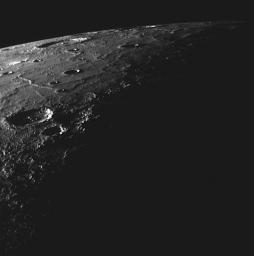
|
Tip of the Crescent
- Click the image above for a larger view
- Full-Res JPEG (1018 x 1024) (59.4 kB)
- Full-Res TIFF (1018 x 1024) (1.0 MB)
Caption:
As MESSENGER approached Mercury during the spacecraft's third Mercury flyby, the Solar System's innermost planet appeared to the imaging system as a sunlit crescent against the blackness of space. About 78 minutes prior to closest approach, the NAC captured this striking high-resolution image of the northernmost region of Mercury's surface that was visible to the camera and illuminated by sunlight. The brightly lit northeastern walls of large impact craters can be seen near the horizon, catching the grazing rays of the Sun. The high Sun angle also accentuates wrinkle ridges winding across the smooth plains. In the foreground, features cast long shadows and the terminator separates day from night.
Date Acquired:
September 29, 2009
Image Mission Elapsed Time (MET):
162744006
Instrument:
Narrow Angle Camera (NAC) of the Mercury Dual Imaging System (MDIS)
Scale:
The crater near the middle of the left edge of the image is approximately 100 kilometers (60 miles) in diameter
Spacecraft Altitude:
16,200 kilometers (10,100 miles)
Background Info:
These images are from MESSENGER, a NASA Discovery mission to conduct the first orbital study of the innermost planet, Mercury. For information regarding the use of images, see the MESSENGER image use policy .
Cataloging Keywords:
| Name | Value | Additional Values |
|---|---|---|
| Target | Mercury | |
| System | ||
| Target Type | Planet | |
| Mission | MESSENGER | |
| Instrument Host | MESSENGER | |
| Host Type | Orbiter | |
| Instrument | Mercury Dual Imaging System (MDIS) | |
| Detector | Narrow Angle Camera (NAC) | |
| Extra Keywords | Crater, Grayscale, Impact, Shadow | |
| Acquisition Date | ||
| Release Date | 2009-10-14 | |
| Date in Caption | 2009-09-29 | |
| Image Credit | NASA/Johns Hopkins University Applied Physics Laboratory/Carnegie Institution of Washington | |
| Source | photojournal.jpl.nasa.gov/catalog/PIA12306 | |
| Identifier | PIA12306 | |
